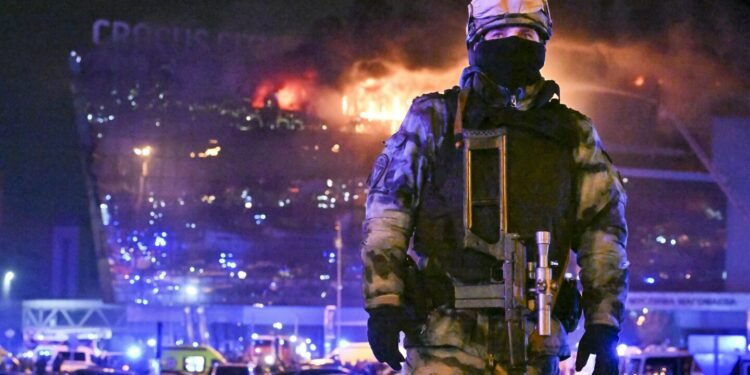Hours before gunmen last week carried out the bloodiest attack in two decades in Russia, authorities made an addition to a government register of extremist and terrorist groups: They included the international LGBTQ+ “movement.”
That addition to the register followed a Russian Supreme Court court ruling last year that cracked down on gay and transgender people in the country.
While the register also lists al-Qaida and the Islamic State group, an affiliate of which claimed responsibility for the concert hall attack, the inclusion of LGBTQ+ activists raised questions about how Russia’s vast security services evaluate threats to the country.
The March 22 attack that killed over 140 people marked a major security failure under President Vladimir Putin, who came to power 24 years ago by taking a tough line against those he labeled terrorists from the Russian region of Chechnya waging a bloody insurgency.
The lapse in security has led many to wonder how gunmen could easily kill so many people at a public event. One week after the massacre, here’s a look at what’s behind the failure to prevent the concert hall attack and the government’s chaotic response to it:
Russia’s massive security apparatus has focused in recent years on stifling the political opposition, independent media and civil society groups in the harshest crackdown since Soviet times. The repressions have only intensified after the invasion of Ukraine.
Individual protesters are swiftly quashed by riot police. After the Feb. 16 death of opposition leader Alexei Navalny in prison, mourners bringing flowers and candles to makeshift memorials were quickly detained. Surveillance cameras with facial recognition software are widely used.
Many opposition groups have been branded as “extremists” -– a designation that carries long prison terms for anyone associated with them.
Navalny was serving a 19-year sentence on charges of extremism, and his political network is on the register of extremist and terrorist organizations, just like the LGBTQ+ “movement” that on March 22 was added to the register of Russia’s state watchdog for financial crimes.
Top Navalny associate Leonid Volkov, who lives abroad, said the security agencies are too busy with the political crackdown to pay attention to terrorism threats.
“They like inventing fictitious terrorists — those who think or love differently — so they don’t have time for real ones,” he said on his messaging app channel.
Many security officers are focused on suspected Ukrainian agents and fending off sabotage and other attacks by Ukraine in the 2-year-old war. They also are scouring social media for signs of anti-war sentiment.
After the attack, law enforcement agencies followed a familiar pattern of repression, detaining people over social media posts about it that authorities deemed offensive.
Andrei Kolesnikov, senior fellow at Carnegie Russia Eurasia Center, said security forces focused on Kremlin critics but have proven inadequate in tackling real threats to the country.
“This machine can’t be effective when it has to perform its direct function to ensure citizens’ security,” he wrote in a commentary, noting Putin has had nearly a quarter- century to ensure “stability and security, but instead he ruined both.”
The U.S. government said it told Russia in early March about an imminent attack under the “duty to warn” rule that obliges U.S. intelligence officials to share such information, even with adversaries. It was unclear how specific it was.
The U.S. Embassy in Moscow also issued a public notice March 7 advising Americans to avoid crowds in the capital over the next 48 hours due to “imminent” plans by extremists to target large gatherings, including concerts.
With Russia-U.S. relations at their lowest point since the Cold War, Moscow was likely to treat any such tip with suspicion. Three days before the attack, Putin dismissed the U.S. Embassy notice as an attempt to scare or intimidate Russians and blackmail the Kremlin.
Alexander Bortnikov, head of the Federal Security Service, or FSB, said the U.S. warning was general and didn’t help track down the attackers. He said the FSB, acting on the tip, targeted some suspects but it proved wrong.
Putin and other officials tried to divert attention from the security failure by seeking to link the attack to Ukraine despite Kyiv’s emphatic denials and the Islamic State affiliate’s claim of responsibility.



 Pakistan Rupee Exchange Rate
Pakistan Rupee Exchange Rate





